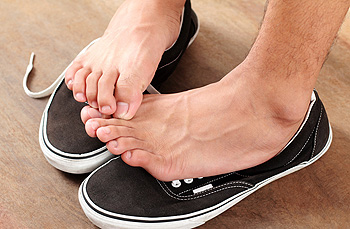 Hyperhidrosis is the medical term for a condition that causes excessive sweating all over the body. Plantar hyperhidrosis is a form of this condition that specifically affects the feet. This ailment usually begins in childhood or adolescence, and in severe cases can cause some physical limitations. The extra moisture can make the feet more prone to bacterial or fungal infections and blisters. Tinea pedis and pitted keratolysis are two examples of possible infections that can result from excess moisture. These two infections can easily be treated with antifungal cream, antibiotic cream, or medication. Plantar hyperhidrosis is symmetric, so it affects both feet equally. The sweating can range from mild excessive sweating to severe constant sweating. If you think you may have plantar hyperhidrosis, then it is recommended you consult with a podiatrist to learn new methods to help living with this condition.
Hyperhidrosis is the medical term for a condition that causes excessive sweating all over the body. Plantar hyperhidrosis is a form of this condition that specifically affects the feet. This ailment usually begins in childhood or adolescence, and in severe cases can cause some physical limitations. The extra moisture can make the feet more prone to bacterial or fungal infections and blisters. Tinea pedis and pitted keratolysis are two examples of possible infections that can result from excess moisture. These two infections can easily be treated with antifungal cream, antibiotic cream, or medication. Plantar hyperhidrosis is symmetric, so it affects both feet equally. The sweating can range from mild excessive sweating to severe constant sweating. If you think you may have plantar hyperhidrosis, then it is recommended you consult with a podiatrist to learn new methods to help living with this condition.
If you are suffering from hyperhidrosis contact one of our podiatrists of Princeton Foot and Ankle Associates. Our doctors can provide the care you need to attend to all of your foot and ankle needs.
Hyperhidrosis of the Feet
Hyperhidrosis is a rare disorder that can cause people to have excessive sweating of their feet. This can usually occur all on its own without rigorous activity involved. People who suffer from hyperhidrosis may also experience sweaty palms.
Although it is said that sweating is a healthy process meant to cool down the body temperature and to maintain a proper internal temperature, hyperhidrosis may prove to be a huge hindrance on a person’s everyday life.
Plantar hyperhidrosis is considered to be the main form of hyperhidrosis. Secondary hyperhidrosis can refer to sweating that occurs in areas other than the feet or hands and armpits. Often this may be a sign of it being related to another medical condition such as menopause, hyperthyroidism and even Parkinson’s disease.
In order to alleviate this condition, it is important to see your doctor so that they may prescribe the necessary medications so that you can begin to live a normal life again. If this is left untreated, it is said that it will persist throughout an individual’s life.
A last resort approach would be surgery, but it is best to speak with your doctor to find out what may be the best treatment for you.
If you have any questions please feel free to contact our offices located in Princeton, and West Windsor, NJ . We offer the newest diagnostic and treatment technologies for all your foot and ankle needs.
